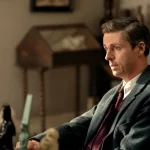House of Gucci: Bankrupt, by Tyler Smith

There is much to recommend in House of Gucci, Ridley Scott’s tale of upper-class betrayal and murder. It’s a great-looking movie with a cast of committed heavy-hitters all playing juicy roles. Unfortunately, much of that gets lost in a tone that is muddled, slight, and ultimately condescending. Were the film to be merely empty, there might still be enough on the surface to at least entertain an audience. But the film’s smugness becomes so all-encompassing that it acts as a black hole, consuming whatever worthwhile elements the film might contain. It feels almost immoral for a film with this much promise to be this disappointing.
The story revolves around the fall of the wealthy and powerful Gucci family, beginning with working-class Patrizia Reggiani (Lady Gaga) marrying timid Maurizio Gucci (Adam Driver) and slowly working her way into the family’s business and fortune. Patrizia’s influence on Maurizio eventually leads to lying, cheating, and stealing within the family, chiefly amongst Maurizio’s father Rodolfo (Jeremy Irons), his uncle Aldo (Al Pacino), and his cousin Paolo (Jared Leto). As everything begins to crumble, so too does Patrizia and Maurizio’s commitment to each other. This logic-defying saga eventually ends with a murder and the family itself in shambles.
At the core of the story – and what Scott wisely understands will draw in the audience – is our inherent obsession with wealth. Countless television shows have been devoted to the lives of well-to-do elites who seem to exist in an entirely different reality than our own. We all wonder what we would do with that much money; surely we wouldn’t spend it on such gaudy extravagances as these tacky would-be icons.
It is in this second respect – this assuredness that our sensibilities are somehow inherently superior to those with infinitely more resources – that House of Gucci reveals its true intentions. Unlike previous explorations of wealth, murder, and scandal – such as Barbet Schroeder’s brilliant Reversal of Fortune – this film contains no real curiosity about its subject. What drives these characters, so removed from the everyday world yet still containing the same human traits as the rest of us? How can anybody who operates in a society that prides itself on being civilized justify planning a murder?
Not only are questions like these never answered, but they’re not even posed. The film has all the depth of a tabloid, turning its subjects into caricatures and sensationalizing tragedy. The difference, though, is that even a tabloid might occasionally speculate what might be going on inside its subjects. House of Gucci shows no such curiosity, putting the burden of inquiry on its capable cast, all of whom turn in solid work that is rendered shallow by a filmmaker who shows astonishingly little interest in what motivates these colorful characters.
We do get the occasional flash of humanity in the film, not in its direction and certainly not in its script, but in the acting; in those brief moments that happen between the lines of dialogue. We get brief glimpses of loneliness, longing, and genuine love, perhaps most notably from Al Pacino, whose Aldo is ruthless but still able to convey affection without agenda. The rest of the cast is dependable and one wonders just how much more they could have done with less complacent material.
We know nothing more about this tragic story at the end of the film than we do at the beginning. And there’s something kind of perverse about a 157-minute film that provides no new information. Of course, there have been plenty of films specifically about the emotional distance and general unknowability of the upper class – such as Citizen Kane and The Rules of the Game – or about the inherent shallowness and lack of introspection of the super-rich – like The Wolf of Wall Street – but they require just the right amount of balance, lest they tip too far into judgment and superiority.
In giving House of Gucci the benefit of the doubt, we can simply say that it never quite finds the right balance. But what is more likely is that Ridley Scott approached the material with a very purposeful cynicism and dismissal, feeling that there is nothing we could ever possibly glean from this story of wealth and decadence. And while I wouldn’t begrudge Scott for incorporating his own point of view into the film, I also can’t act like the film is a satisfying experience. Instead, it is exhausting, haughty, and ultimately empty.






























